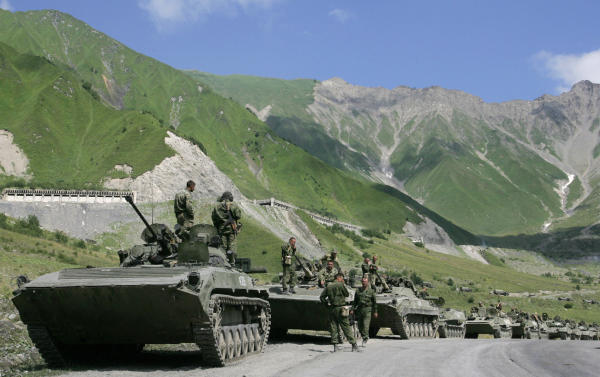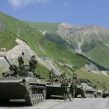
Putin Confirms the Invasion of Georgia Was Preplanned
Publication: Eurasia Daily Monitor Volume: 9 Issue: 152
By:

The fourth anniversary of the August 2008 Russo-Georgian war has been marked by a seemingly open spat between the supporters of President Vladimir Putin and Prime Minister Dmitry Medvedev. In a 47-minute documentary film of unclear origin, “Lost Day,” posted on YouTube, retired and active service top Russian generals, including Army General, former First Deputy Defense Minister and Chief of the General Staff Yuri Baluyevsky, accuse Medvedev of indecisiveness and cowardice during the conflict with Georgia and praise Putin. According to Baluyevsky, a decision to invade Georgia was made by Putin before Medvedev was inaugurated President and Commander-in-Chief in May 2008. A detailed plan of military action was arranged and unit commanders were given specific orders in advance. In August 2008, according to Baluyevsky, Medvedev needed to issue a simple order: “Go” – and commanders would open sealed envelopes with combat orders that were given to them beforehand to commence the invasion. Instead, Medvedev and Defense Minister Anatoly Serdyukov hesitated, until Putin, who in August 2008 was attending the opening of the Olympics in Beijing, phoned, “kicked their soft place,” recounts Baluyevsky, and the invasion began. According to Baluyevsky, the top political and military leadership in Moscow was hesitant to take responsibility, and “if a timely command was given, the casualties would have been much smaller.” The “Lost Day” tells a story about Medvedev’s “humiliating consultations” with Western leaders in August 2008 and the “enemy” (the United States) that is always seeking a pretext to attack Russia with nuclear weapons (https://rutube.ru/video/eddef3b31e4bdff29de4db46ebdd4e44/; https://www.youtube.com/watch?v=OTXPbA9njCw).
Putin’s press service immediately confirmed the “Lost Day” as a genuine documentary. After a meeting with his Armenian counterpart, Serzh Sargsyan, in the Kremlin, Putin confirmed to journalists the accuracy of some of the “Lost Day” allegations. According to Putin, the plan to invade Georgia was prepared in advance and “the Russian side acted within the framework of that plan.” The General Staff of the Armed Forces prepared the plan of military action against Georgia “at the end of 2006, and I authorized it in 2007,” continued Putin. According to the plan, heavy weaponry and troops were prepared and mobilized for the coming invasion. As part of the Russian Defense Ministry plan, Ossetian separatist forces were trained and armed to act as auxiliary forces in the preplanned engagement with the Georgian military. According to Putin, “Our military specialists believed they [Ossetian separatist militias] could not provide assistance in a clash of regular armies, but they turned out to be much needed.” Putin confirmed he phoned from Beijing several times on August 7 and 8, 2008 to talk with Medvedev and Serdyukov (RIA Novosti, August 8).
Putin’s presidential pool journalists never publicly ask the president unwanted or un-vetted questions. Putin could have ignored an anonymous documentary film posted on YouTube, but apparently decided otherwise, prompting speculation in Moscow of a serious rift in the so called ruling “tandem” of Medvedev and Putin. Previously Medvedev publicly insisted that he independently took the decision to invade Georgia as acting Commander-in-Chief, and consulted with Putin much later in the evening of August 8, 2008, when the forward Russian tanks had already reached the beleaguered South Ossetian capital Tskhinvali. Medvedev’s press secretary Natalya Timakova confirmed this week (“as a witness”) Medvedev’s narrative of acting independently in August 2008 without any prompting phone calls from Putin. Timakova accused Russian generals of envying Medvedev’s successes in the war with Georgia (Vedomosti, August 9).
This week, while commemorating the anniversary of the war in Tskhinvali, Medvedev rejected the narrative of the “Lost Day” film, announcing that the decision to use force against Georgia was taken “at the right time” and “the decision of a rocket attack was taken at 4 a.m., August 8 [2008].” In the passage about an authorized rocket attack, Medvedev is apparently referring to the order to attack Georgian cities and military bases with ballistic Tochka-M and Iskander missiles. According to Medvedev, “Those who speak different, do not know, or are lying – such decisions are taken by only one man, the Commander-in-Chief, and that was me.” Medvedev insisted the decision was not easy “since we recognized until August 26 [2008] the foreign state of Georgia [with sovereignty over Abkhazia and South Ossetia].” Medvedev added, “We had special relations with Abkhazia and South Ossetia, but also talked about the territorial integrity of Georgia, though we understood this was practically impossible” (Interfax, August 9).
The “Lost Day” film and the comments by Putin and Medvedev have revealed a great deal: that the invasion of Georgia in August 2008 was indeed a preplanned aggression and that so-called “Russian peacekeepers” in South Ossetia and Abkhazia were in fact the vanguard of the invading forces that were in blatant violation of Russia’s international obligations and were training and arming the separatist forces. The admission by Putin that Ossetian separatist militias acted as an integral part of the Russian military plan transfers legal responsibility for acts of ethnic cleansing of Georgian civilians and mass marauding inside and outside of South Ossetia to the Russian military and political leadership. Putin’s admission of the prewar integration of the Ossetian separatist militias into the Russian General Staff war plan puts into question the integrity of the independent European Union war report, written by Swiss diplomat Heidi Tagliavini that accused the Georgians of starting the war and attacking Russian “peacekeepers,” which, according to Tagliavini, warranted a Russian military response (www.ceiig.ch/pdf/IIFFMCG_Volume_I.pdf).
After agreeing not to seek reelection for a second term as President and becoming Prime Minister last May, Medvedev has been visibly sidelined on the Moscow political scene and has been struggling to assert himself. The “Lost Day,” which praises Putin as the great statesman and brands Medvedev a coward, has been interpreted as a move by Putin’s entourage in the Kremlin to undermine Medvedev and possibly initiate his ouster (Moskovsky Komsomolets, August 9).
In response to the “Lost Day” controversy, the Georgian Foreign Ministry has issued a statement calling the international community to “demand from Russia nonuse of force against Georgia” (www.newsgeorgia.ru, August 9). However, Putin does not seem to expect any censure from Brussels or Washington, where the Barack Obama administration is continuing to appease Moscow with its luckless “reset” policy. Most likely the Russian General Staff today has another “plan” of invading and occupying the rest of Georgia, while the decision to go and when, as last time, will be decided by the same one person – Putin.




